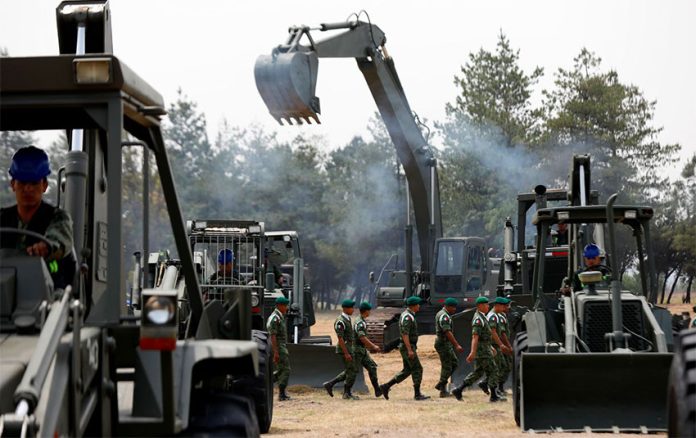The federal government’s decision to entrust large infrastructure projects to the army is an impediment to economic growth, some experts say.
President López Obrador has put the Ministry of National Defense (Sedena) in charge of building the new Mexico City airport at the Santa Lucía Air Force base, two sections of the Maya Train project in the country’s southeast and 2,700 branches of the state-owned Banco del Bienestar (Bank of Well-Being).
He says the government’s large-scale infrastructure projects – among which is also a new refinery to be built by the state oil company on the Tabasco coast – will help generate 2 million new jobs by the end of this year.
But some experts say that more jobs would be created and the Mexican economy would benefit more if specialized construction companies were awarded contracts for the projects that have been entrusted to the army.
José Ignacio Martínez Cortés, head of the Laboratory of Trade, Economy and Business at the National Autonomous University, told the newspaper El País that while Sedena subcontracts small and medium-sized businesses to complete work on its infrastructure projects, the economic spillover is less than that which would be created by large private construction companies.
The spillover generated by Sedena-built infrastructure projects is not as big for two main reasons, El País said.
The first is that fewer jobs are created because construction work is carried out by military personnel who are already on the payroll of the Defense Ministry. The second reason is that the army is not a for-profit corporation and therefore it doesn’t generate revenue that is reinvested in the country.
According to César Gutiérrez, a lawyer who specializes in military and national security matters, military leaders have convinced López Obrador to entrust infrastructure projects to the army by telling him that his government will save money by doing so.
“The military men themselves sell him the idea [saying] ‘don’t worry Mr. President, you don’t need to go around spending on construction companies because we have the biggest construction company in the country, … the military engineers. We have an extremely cheap [construction] workforce because [their labor] is already included in [their] salaries,’” he said.
However, Gutiérrez charged that there is resentment within the army as a result of the president assigning it responsibility for building infrastructure projects.
“How do you think a soldier or an official feels about having to be working at full speed to meet new obligations … [while] receiving the same salary?”
In a recently published report, a researcher at the Espinosa Yglesias Study Center, a Mexico City think tank, also said that entrusting infrastructure projects to the military has a negative economic impact on the national construction sector, which in April had its worst month since 1995.
Enrique Díaz-Infante said that small and medium-sized construction businesses and their employees are adversely affected.
He wrote that the recovery of the economy from the coronavirus-induced downturn and the generation of jobs will depend on the success of sectors such as construction. His claim is supported by Inegi, which found that the construction industry has positive flow-on effects for 66 other economic activities as well as the potential to create jobs en masse.
In addition to cutting costs, the desire to eliminate corruption is another factor in López Obrador’s decision to put the army in charge of infrastructure projects. Indeed, one of the main reasons he cited to justify the cancelation of the former government’s Mexico City airport project was that it was corrupt.
An Inegi poll shows that the armed forces have an approval rating of 80% among the Mexican population, seemingly indicating that the army can be trusted to manage infrastructure projects honestly and transparently.
However, a researcher at the Bonn International Center for Conversion, an independent organization in Germany that deals with a wide range of global topics in the field of peace and conflict research, told El País that there is no guarantee that army officials won’t award contracts to companies to which they have personal connections.
Elke Grawert, the co-author of a book entitled Businessmen in Arms: How the Military and Other Armed Groups Profit in the MENA Region, stressed that the possibility for corruption to which she was referring was at an individual rather than institutional level.
El País noted that both the army and the navy have made purchases and awarded contracts that failed to comply with public tender transparency requirements. During previous governments, Sedena paid US $46 billion to about 100 companies that didn’t comply with legal requirements and didn’t have the personnel or technical capacity to complete the work the were assigned, El País said.
Some of them were in fact ghost, or front, companies, it added.
Grawert also raised doubts about whether the Mexican army has the necessary expertise.
“There is no reason to think that the army is necessarily competent as a builder. The question is: is the army really the best organization to do this work? Is it really better at construction management than expert private firms?”
López Obrador has set tight deadlines for the completion of the army-managed projects so the answers to those questions should become clear sooner rather than later.
Source: El País (sp)
